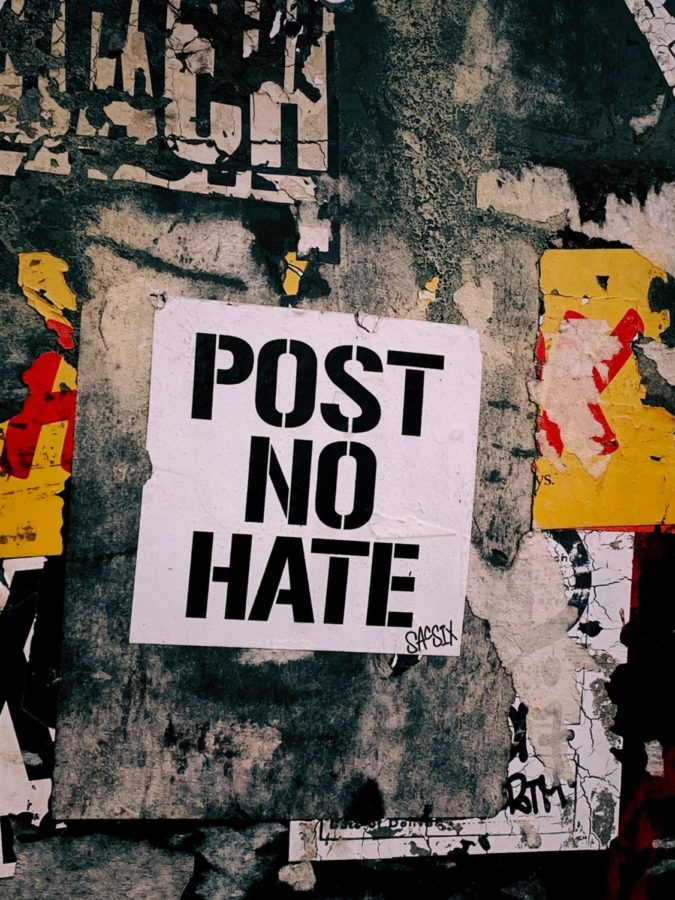Editorial: It’s time for the United States to provide a legal definition for hate speech
November 18, 2020
In 2019, the FBI reported that personal attacks motivated by bias or prejudice reached a 16-year high in 2018 with a significant upswing in violence against Latinos.
While crimes against property went down, physical assaults against people were up, accounting for 61 percent of the 7,120 incidents classified as hate crimes by law enforcement officials nationwide.
The FBI defines a hate crime as a “criminal offense against a person or property, motivated in whole or in part by an offender’s bias against a race, religion, disability, sexual orientation, ethnicity, gender or gender identity.” Victims of hate crimes can include institutions, religious organizations and government entities as well as individuals, according to the FBI.
Even with the FBI having its own definition of a hate crime, the United States has no legal definition for hate speech, which has undoubtedly been occurring more in the last few years, just as with the physical assaults labeled as hate crimes by the FBI.
In the United States, hate speech is protected by the First Amendment. Courts extend this protection on the grounds that the First Amendment requires the government to strictly protect robust debate on matters of public concern, even when such debate devolves into distasteful, offensive or hateful speech that causes others to feel grief, anger or fear. The Supreme Court’s decision in Snyder v. Phelps provides an example of this legal reasoning.
Due to there being no legal definition, nothing can be done to the perpetrators of hate speech or for the victims of it who often feel threatened by the things said to them. We on the ISD Editorial Board think it is high time the United States gets on top of the rise of hate speech and finds a way to decrease it, and the easiest way we see that is to start with a legal definition.
The Encyclopedia Britannica defines hate speech as “speech or expression that denigrates a person or persons on the basis of (alleged) membership in a social group identified by attributes such as race, ethnicity, gender, sexual orientation, religion, age, physical or mental disability and others.”
The encyclopedia goes on to say hate speech typically involves epithets and slurs, statements that promote malicious stereotypes and speech intended to incite hatred or violence against a group. Hate speech can take place in written and verbal forms — both in person and on the internet. It exists everywhere in our world and just isn’t always spoken.
Hate speech can also include nonverbal depictions and symbols. For example, the Nazi swastika, the Confederate Battle Flag (of the Confederate States of America) and pornography have all been considered hate speech by a variety of people and groups who have been oppressed by those symbols in the past or degraded by them during our present.
We on the Editorial Board and other critics of hate speech agree it causes psychological harm to its victims in many ways, and it also can lead to physical harm when it incites violence, like the hate crimes the FBI has seen an increase in. Hate speech can also undermine the social equality of its victims, and this is particularly true because the social groups that are commonly the targets of hate speech have historically suffered from social marginalization and oppression.
Research focused on the impact of racial, ethnic, religious, gendered and LGBTQIA+ hate speech finds the targets of hate speech can experience negative emotional, mental and physical consequences. These can include low self-worth, anxiety, fear for their lives and even self-harm or suicide.
Expressions of hate against minority populations can be used to normalize discrimination, outbreaks of hate crimes and targeted violence. Even for those who simply witness it, hate speech harms our ability to effectively process information.
Many examples of online disinformation are centered around exploiting social struggles around race and ethnicity, deepening these social rifts through use of hate speech. This is designed to inflame our emotions and prevent us from evaluating the truth or falsity of the claim.
What all of this means is hate speech is a common occurrence and many United States citizens face it every single day, in their workplaces, when traveling through their cities, when eating out and when on the internet. Because of its prevalence, we believe it is time the United States has a legal definition of hate speech so the country can move forward as a society, just like other countries who have done even more.
Democracies such as France, Germany, Canada, and New Zealand have all implemented laws designed to curtail hate speech, but we on the Editorial Board do not believe the United States is at a place where a law limiting the free speech given in the First Amendment would be a good idea.
Implementing laws to restrict speech is too radical a move at this time, but a definition determined by the Supreme Court or other governing body of the United States would show the government does care for its marginalized communities and it is taking steps forward to curtail hate speech without implementing laws that take away from people’s First Amendment rights.

















